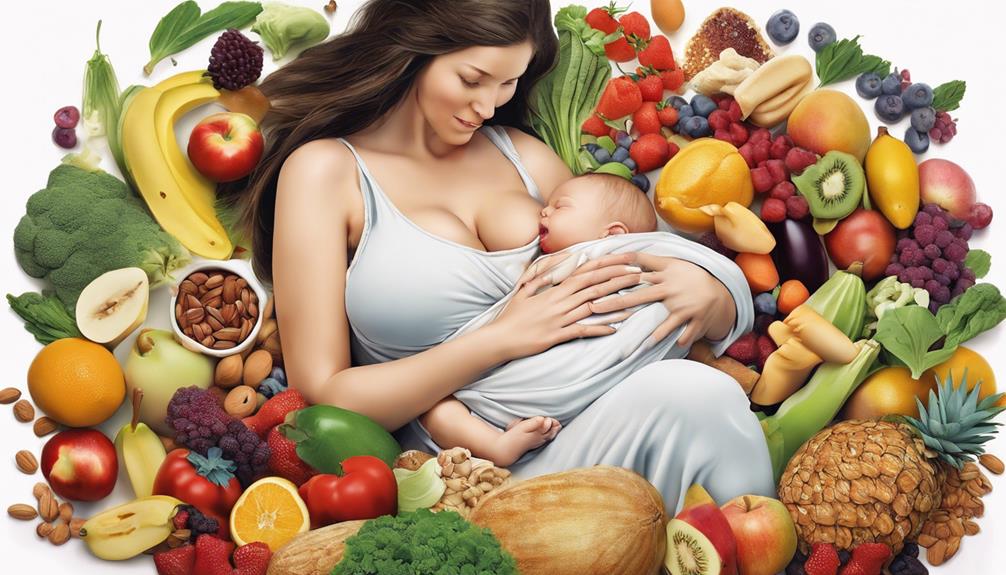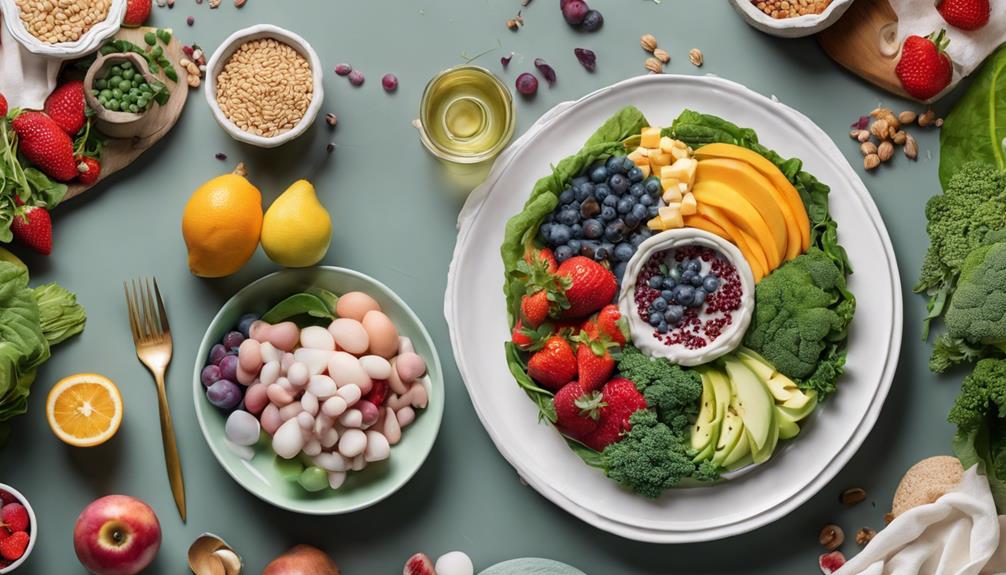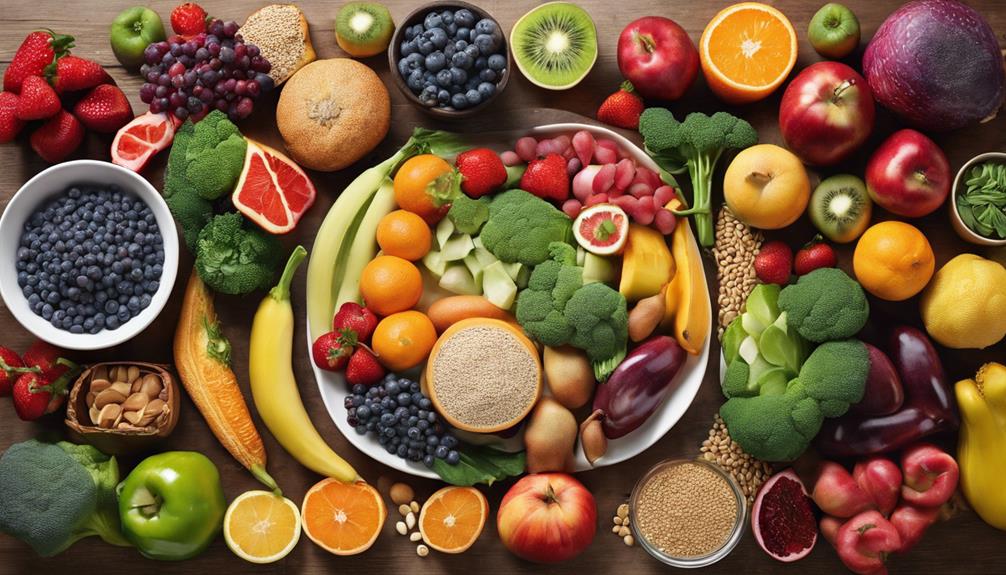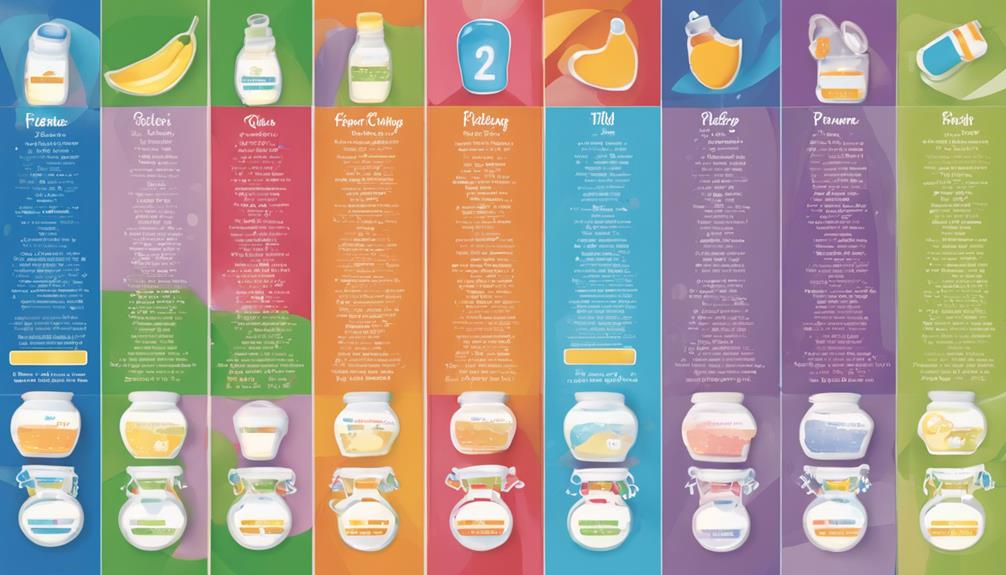As busy breastfeeding moms, we recognize the challenges of finding time to prioritize our own nutrition amidst caring for our little ones.
However, ensuring we consume a well-balanced diet postpartum is essential not just for our own well-being but also for the health of our babies.
From providing essential nutrients to managing special dietary considerations, there are key aspects to ponder in our postpartum diet.
Let's explore how these factors can contribute to a healthy breastfeeding journey for both mother and baby.
Key Takeaways
- Lean beef, eggs, and legumes provide essential protein for tissue repair and energy.
- Adequate hydration is crucial for milk production and overall well-being.
- Avoid alcohol and limit caffeine intake to maintain the quality of breast milk.
- Tracking potential allergens in the diet can help manage allergies in breastfed babies.
Nutrient-Rich Foods for Breastfeeding Moms
When considering a postpartum diet for breastfeeding moms, incorporating nutrient-rich foods is essential for excellent health and energy levels. Protein-rich foods such as lean beef, eggs, and legumes play a vital role in tissue repair and provide the necessary energy levels required during the demanding period of breastfeeding.
Iron-rich foods are equally important as they aid in oxygen transport and energy production, helping to prevent cognitive issues like postpartum depression. Including a variety of vegetables in your diet is key to obtaining essential vitamins, minerals, and fiber necessary for overall health postpartum.
Nutrient-packed soups aren't only easy to digest but are also great for replenishing fluids and providing comfort, making them a convenient option for busy breastfeeding mothers. Excellent amino acid balance derived from protein-rich foods, coupled with iron and vegetable intake, supports a healthy postpartum diet essential for breastfeeding mothers' well-being and recovery.
Hydration Tips for Nursing Mothers

Pivoting from discussing nutrient-rich foods for breastfeeding moms, maintaining proper hydration is essential for nursing mothers to support milk production and overall well-being.
Adequate fluid intake is critical for nursing mothers as breastfeeding can increase their hydration needs. It's important to drink water whenever feeling thirsty and keep an eye on urine color as a hydration indicator; dark yellow urine may signal dehydration, requiring increased fluid intake.
While caffeinated and sugary beverages should be limited, water remains the best choice for staying hydrated. By staying well-hydrated, nursing mothers can prevent issues like constipation and fatigue, benefiting both themselves and their breastfeeding babies.
Alcohol and Caffeine Guidelines
To guarantee the well-being of both mother and baby, following recommended guidelines on alcohol and caffeine intake is essential for breastfeeding moms. When it comes to alcohol and caffeine consumption while breastfeeding, it's important to be mindful of how these substances can affect both you and your little one.
- Alcohol Clearance: It's advised to wait 2-3 hours after consuming alcohol before breastfeeding or pumping to ensure its clearance from breast milk. This helps in preventing any potential negative effects on the baby due to alcohol intake.
- Caffeine Impact: Caffeine can transfer to breast milk, potentially affecting some babies' sleep patterns. Limiting or avoiding caffeine may be necessary to ensure your baby's peaceful rest and well-being.
- Quality of Breast Milk: Following guidelines on alcohol and caffeine consumption is essential for maintaining the quality of breast milk. By limiting caffeine intake to 2-3 cups per day and being cautious with alcohol consumption, you can help safeguard the well-being of your baby.
Managing Allergies in Breastfed Babies

Breastfed babies may develop allergies to various common allergens, including dairy, soy, wheat, and eggs, which necessitates careful management strategies. Keeping a food diary to track any potential triggers causing allergies in infants is important. By eliminating suspected allergens like milk and dairy products from the mother's diet, allergy symptoms in breastfed babies can often be alleviated. However, consulting a healthcare provider for guidance on managing allergies in breastfed babies effectively is necessary.
In addition to the more common allergens, less frequent triggers for breastfed babies can include fish, nuts, peanuts, or corn. Identifying and avoiding these allergens can play a significant role in preventing allergic reactions in infants. If you notice any signs of infant allergies, such as rashes, eczema, or gastrointestinal issues, seek advice from a healthcare professional promptly. Managing allergies in breastfed babies requires a proactive approach and close collaboration with a qualified healthcare provider to guarantee the well-being of both the baby and the breastfeeding mother.
Sharing Nutrients With Baby Through Milk
Nourishing infants through breast milk involves the transfer of essential nutrients important for their growth and development. As breastfeeding mothers, we play a vital role in providing our little ones with the necessary building blocks for a healthy start in life.
Here are three key points to think about when it comes to sharing nutrients with our babies through breast milk:
- Breast milk contains important nutrients like protein, calcium, and iron that are essential for the baby's growth and development.
- Consuming foods rich in DHA, such as fish, can support brain development in our nursing infants.
- Maintaining a balanced diet that includes a variety of nutrient-rich foods is important to make sure that our breast milk offers excellent nutrition for our growing babies.
Frequently Asked Questions
What Are the Best Postpartum Foods for Breastfeeding?
We prioritize protein-rich foods like lean meat and legumes, iron-rich options for energy, and vegetables for essential nutrients. Soups are also great for hydration and comfort. These choices help us feel strong and nourished while breastfeeding.
What Is the Best Diet for Breastfeeding Mothers?
We focus on a nutrient-rich diet for breastfeeding, emphasizing protein sources, vegetables, fruits, and whole grains. Staying hydrated is key. Adjust calorie intake based on baby's needs. Our goal is to support both baby and mom's health.
What Is the Most Important Food While Breastfeeding?
Protein-rich foods like lean meats and legumes are important while breastfeeding as they aid in tissue repair and energy production. Ensuring a balanced diet with iron-rich foods is essential for oxygen transport and preventing issues like postpartum depression.
What Foods Should Breastfeeding Moms Avoid?
Avoid high-mercury seafood, excessive caffeine, alcohol, and allergenic foods like cow's milk or peanuts while breastfeeding. Processed foods with high sugar and fats should also be limited. These choices promote a healthier diet for both mom and baby.
Conclusion
To summarize, a nutrient-rich diet is crucial for breastfeeding moms to support their health and milk production.
Remember, you're what you eat, and your baby is what you feed them.
So, let's nourish ourselves with the right foods to guarantee both mom and baby thrive.
As the saying goes, 'you can't pour from an empty cup,' so prioritize your own well-being to provide the best care for your little one.









